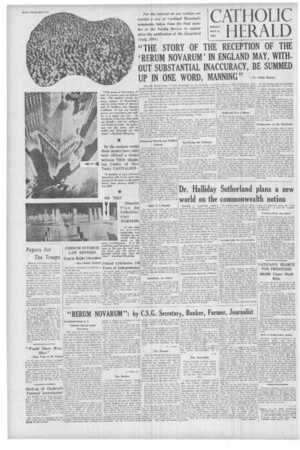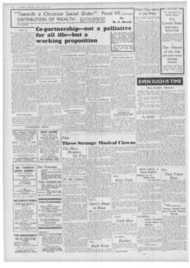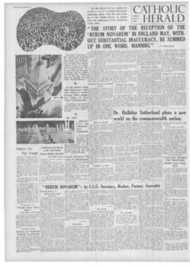Page 1, 9th May 1941
Page 1

Page 8

Report an error
Noticed an error on this page?If you've noticed an error in this article please click here to report it.
Tags
Share
Related articles
London Celebrates Social Encyclical
Question Of Justice
Partnership And Class War
Rerum Novarum In The Niteries
"rerum .novarum" .in Holland
Dorothy Sayers:
Loath as I am to appear in the role of a public critic of Rerum Novarum, particularly as until quite recently I belonged to the too large body of people who knew of it but hadnever read it, there is one point I should like very much to make.
It seems to me that Pope Leo, preoccupied with the then paramount question of the relation of workers to employers and employers to the workers, does not sufficiently emphasise the relation of the worker to the work, as the exercise of that creative faculty through which even in its meanest manifestations man properly gives honour and glory to God and fulfils the part of his nature made in the image and likeness of the Creator.
The sense of vocation in work has so far departed under capitalistic industrialism which brought in its train such grievous problems in justice that this essential aspect of love of God is lost sight_of.
MEDIEVAL GUILDS HAD THE TRUTH
We must reaffirm the truth which was so fully understood by the medieval guilds.
The guilds protected not only the worker but the work, not only the work but also the employer, producer, and the buyer or consumer as well. endeavouring to assure that the whole cycle' was lit and worthy to be counted service of God, The practical difficulties of assuring the place of the principle laborare eat orare in a modern highly sub-divided mechanical production process must not deter us from fearlessly establishing it.
Until wc consciously and articulately aim at killing the fallacy which underlies the terms of everyday speech " making a living," " means of livelihood," " in business," '' at work," " occupation," and substitute in principle and fact vocation, living work, service, we cannot live integral Christian lives.
VICIOUS CIRCLE Nothing to do with hours and wages is so important as to get rid of the vicious circle — ." work-for-money-to-buy-food-to-be-ableto-live-to-work-for-money," etc.. and set up in its place again the true Christian ideal which unifies Life: Living Work and all the happiness which comes from the exercise of human functions as being to the greater Glory of God.
The great Encycllcals, the publication of which you are celebrating, do imply all this, and indeed touch explicitly on the problem, but they do not, to my mind, sufficiently emphasise it.
IThe above was received over the telephone, and there may be deviations irons Miss Sayers' exact wordingl.
(Continued on page eight)
"RERUM NOVARUM ": by C.S.G. Secretary, Banker, Farmer, Journalist
Catholic Social Guild Secretary Fifty years ago the labourer's claim to reasonable hours and conditions of work, to a decent livelihood for him
self and his family, was regarded by many as a matter outside public concern, except when it was manifested by disturbance, and entirely subordinate to the free play of markets and to supposed economic laws which would brook no interference. Would-be leaders on the worker's behalf offered him a doctrine equally materialist. the doctrine that private ownership was at the root of his troubles and class antagonism the inevitable road to reform.
Pope Leo's encyclical lifted the problem to a higher and a spiritual level. lie denounces the oppression of the poor in the strongest terms. but he shows that the issue in question is that of justice and fraternity. Man is endowed with intellect and freedom. with a destiny to fulfil and with consequent rights that must be respected. He shows that property is a natural right, and that. therefore. rather than abolish property its enjoyment must become more widespread. Against laisser-faire he argues the right to a living wage, the right of working men to combine for mutual help and protection, the duty of the State to help with social legislation and to promote to the utmost the welfare of the poor.
Catholic social doctrine is eminently reasonable and convincing. It appeals readily to men of goodwill and erpresses clearly convictions which are already, however vaguely, in their minds. And so Pope Pius XI was able to place on record the actual achievements of Pope Leo's work. Results could be indicated even among ourselves. His doctrine of the just minimum wage became known in this country when a principle was needed to support the movement for trade boards for sweated industries.
In at least One town council the sense doctrine has raised the wages of the council's labourers. Re11077 Novartim has guided many a trade unionist in his efforts to secure justice. Its arguments have convinced employers and have carried conviction in the affairs of a joint industrial council.
Our jubilee thanksgiving will not be fruitless. We shall be stimulated to a better grasp of Leo's message and of its amplification in Quadragesimo Anna. the great official commentary, the second edition, as it were, given to us by Pius XI when the Church held her universal celebrations ten years ago.
The two Encyclicals, the work of the two Popes, will be commemorated side by side. For US in the Catholic Social Guild, Rerum Novarion in its English translation was our first pamphlet and text book. It will remain always the groundwork on which our task is built.
LEO O'He.a, Si.
The Banker I come of Quaker ancestry, though I am not actually a member of the Society of Friends myself; I am proud of the fact, for Quakers have ever been
with pioneers in the relief of distress and championship of the under-dog.
Pope Leo's masterly analysis sets out in vivid terms what all whose eyes are
not dazed by the past or blinded by wishful thinking for the future rhust recognise as a remarkable vision of the path along which, by the end of the nineteenth century, the worship of materialism was leading the so-called civilised world
We are now confronted by all the dangers attending on ill-considered movements which are themselves inspired by the same psychic materialism; this must be exorcised if the world is to recover its sanity. I sec wise practical guidance and much food for constructive thought in the Encyclical Letter of 1891.
I would venture to hope that the present Pope may use his tremendous influence in the world to translate these high ideas into action, causing individuals and the nations they form to realise the fundamental truth that man does not live by bread alone, and that without vision, product of the spirit, nations perish and individuals lose their souls.
F. L. BLAND.
The Farmer There is little that the farmer can say on the two great encyclicals beyond endorsing every word, and that is perilously near presumption. But I think a true observation is that it is easier in this age, and particularly at the present time for the farmer to adopt their principles than it is for the townsman and manufacturer, for the farmer stands in far nearer relation to his workers than the latter ever can.
There must be few farms where there isn't some relic of the family spirit: the good farmer must always have much of the Patriarch in him. It isn't just a matter of setting a matt to pull a handle on a machine and then leaving him, but of judging the time for the work, the weather for the work, and then, so often, helping with the work with the ensuing mutual satisfaction of seeing a job well done Given this, the farmer is not likely to neglect his labourers' conditions to the same extent as the manufacturer has done, though there is a lot of leeway still to be made up.
Perhaps the greatest need at this time is security of tenure which, to anyone with knowledge of the two Encyclicals, is a cardinal point. With wages skyrocketing in the towns, the farm labourer is beginning to wonder if any of this increase will be passed on to him, but the older men are wise enough to see that this policy, if pursued, is illusory and must end in disaster, and are content to let things bide.
Let us hope that after the war is over, and the War Agricultural Committees have retired to Whitehall, we shall he able to strengthen and consolidate this family spirit, not only in agriculture where it is more easily practised, but throughout the length and breadth of our economy.
If we don't. then the area of collective, i.e., ant-like farming—soul-less farming—to feed soul-less machine-minders will be on us.
E. R.
The Journalist
Front a Catholic working woman who has been in the " Wage Slave" ntarket for over a quarter of a century, secretary to earls, M.Ps. " Intelligence" worker in the last war and journalist ever since.
I once heard Dr. Orchard scoff at the term " Born Catholic " saying there was no such thing as, until we were baptised we were all heathens! Nevertheless, I am what passes for one and that, I am afraid, too often means a certain complacent acceptance of the gift of Faith, knowing in our bones we are right and the rest of the people are wrong.
Practically all my working life has been spent among non-Catholics, and I have listened to the usual quota of attacks on priests, the Inquisition, and how much you pay to go to Confession. The abysmal ignorance of most non-Catholics about the Catholic Church, in general, first appalled me and then left me with a feeling of resig nation. After all, it was their spiritual funeral!
Now, at the request of the CATHOLU HERALD, I have been asked to read Rerun; Novarum, and I am ashamed that I have never read it before. I even feel I owe the convent at which I was educated a grudge for not using it as a text-book in the senior forms. Had I been armed with its wise, practical, irrefutable arguments, 1 would have said to my (always friendly) attackers: " Why not Cut the cackle and come to the horses?" In other words, read Rerum Novarum—so small in size, so terrific in content—and then come to me and argue some more
I would like to appeal to all " born " Catholics (hoping Dr. Orchard doesn't hear me) to arm themselves with Renoir Novarum and get out into the arena.
Especially do I commend this tiny book to the young workers and the students, for any young Catholic worth his or her salt, reasons and argues. Propaganda and the ready-made slogans of the Karl Marx variety abound and have many willing evangelists, but who can believe that the Pope, shut up in his Vatican, has anything constructive to say on the subject of the workers' rights? It will come as a surprise to the young people, caught up in the "new" social plans, to find that a far wider programme was sent out from the Vatican 50 years ago Why do we not hear Reruns Novarunt discussed in the pulpits? If a series of sermons were given on it from time to time there would riot be such a rush on the part of the young to the " Mass without a sermon"! I am sure it is this very divorce of religion and everyday working life that causes so much leakage from the Church Far from being an old, creaking organisation with worn-out shibboleths, the Catholic Church (as Rerum Novarum plainly shows) is forever moving, not with the times, but ahead of them. Perhaps the " publicity " that the golden jubilee is bringing to this remarkable work will awaken Catholics to the fact. After all, in terms of eternity, 50 years is not very long!
GRACE CONWAY.
To-morrow, Saturday, is the first anniversary of the invasion of Holland by the Nazis. A Requiem Mass will be said at 9.30 at Farm Street Church by Fr. Padberg, Chaplain to the Dutch Merchant Service, for the repose of the souls of the soldiers, sailors, and airmen, and the many civilians who fell as the result of enemy action.
Published by the NEW CATHOLIC HERALD LTD., at 67, Fleet Street, London, E.C., and printed in Great Britain by THE BUCKS FREE PRESS, LTD., at Newspapei House High Street, High Wycombe, Friday, May 9, 1941.
blog comments powered by Disqus









